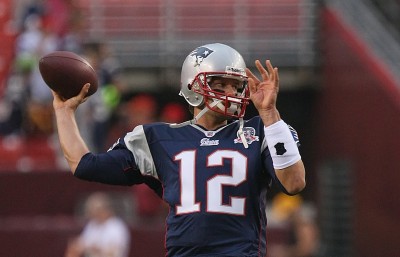
New England Patriots quarterback Tom Brady’s four-game suspension for his role in the Deflategate scandal has officially been nullified.
The word “Deflategate” has poisoned the eardrums of NFL fans since late January, after the Patriots dismantled the Indianapolis Colts in the AFC Championship game, 45-7.
When the scandal first started, I thought it was simply overhyped media that would blow over in a week. The game was a massacre. Anybody who watched it knows that game could’ve been played with golf balls, and New England still would have won by at least 30.
But as the Super Bowl approached, and even well after the Super Bowl, I knew Deflategate was here to stay. As I read more into the situation, I discovered that neither the NFL nor commissioner Roger Goodell had any hard evidence to defend their accusations.
There was, however, scientific fact to support that the footballs could have deflated due to the weather conditions that day. Michael Naughton, head of the Boston College physics department, did an experiment during the beginning of the media coverage. The experiment included inflating a football to 13.5 psi (the maximum allowed by the NFL) at room temperature (72 degrees). He then placed the ball in a refrigerator at 42 degrees, about 5 degrees cooler than the low temperature that fateful day in Foxborough. That football’s pressure fell to 10.5 psi after the test.
Rather than mention that natural elements that day could have accounted for the pressure changes, the Wells Report commissioned by the NFL states that there was an “absence of credible scientific explanation for the Patriots halftime measurements.” Perhaps investigator Ted Wells was referring to the fact that the league used two different pressure gauges (with a 0.4 psi range) to measure the footballs at halftime, and that the NFL does not know which gauge was used in the pre-game measurements since that data was not recorded. I don’t think that’s what he meant, though.
U.S. District Judge Richard Berman settled the Deflategate case last week, rightfully marking the “several significant legal deficiencies” in Goodell’s investigation. In a surprise phone interview monitored by NFL spokesman Greg Aiello, Wells said the NFL paid him “in the millions of dollars” to write his “unbiased” 243-page report.
Despite the genuine lack of proof, though, Goodell slapped a four-game suspension on four-time Super Bowl champion Brady. New England fans were riled up at the thought of their star being suspended, and rightfully so.
Brady’s reputation, despite the Patriots’ “Spygate” scandal of 2007, has been just about flawless. He has been one of the NFL’s most important figureheads for nearly 15 years. And yet, after the smoke has (almost) cleared, it appears as if Goodell has personally chosen to make an example out of him, and will stop at nothing to see that the Patriots’ star misses time this season.
If Deflategate taught me anything at all, it’s that Goodell is both too stubborn and too powerful to run the National Football League.
Goodell has done a few things right for the league. He has increased international awareness regarding the NFL, as London now hosts three games per year. (However, the Buffalo Bills’ Toronto series was terminated.)
He also instituted a fund to provide more financial stability for retired NFL players. Keeping its veterans involved in the league, and more importantly keeping them happy, is something all football fans can support.
For every good move Goodell has made, though, he has made a much worse one. He plays the role of judge, jury and executioner with regard to issuing suspensions and fines. Quite frankly, he has too much power, and he has abused it yet again with Deflategate.
He issued a gargantuan year-long suspension to New Orleans Saints head coach Sean Payton for his involvement in “Bountygate,” which claimed that Saints players were receiving cash incentives for delivering hard hits or injuring their opponents. This was the first time an NFL coach had ever received a suspension — and it was for an entire season. (It’s worth noting that Goodell had very little hard evidence in that case, too.)
Goodell is also responsible for instating the substitute referees following the 2012 lockout. The referees should never be a game’s deciding factor. However, their incompetence decided a few games, including one between two NFL dynamos. The “Fail Mary,” as it has infamously become known, cost the Green Bay Packers the game against the Seattle Seahawks in Week 3. Seattle quarterback Russell Wilson’s pass into the end zone was intercepted by Green Bay’s M.D. Jennings, but the play was ruled a touchdown reception by Seahawks receiver Golden Tate, and the clock expired. By this point, fans were talking about the referees, not the football game.
Now, Goodell is appealing the court’s decision to exonerate Tom Brady. If the stubborn, bullish commissioner gets it his way, this operation that took over six months to decide might not be over yet. From the outside looking in, it seems as though a personal conflict exists between the commissioner and Brady.
It’s gone on long enough, Goodell.
The people don’t want to talk about Deflategate anymore. We want to talk about football. Cut your losses, get ready for the upcoming season and wait until you have proof before you execute someone’s suspension next time.

